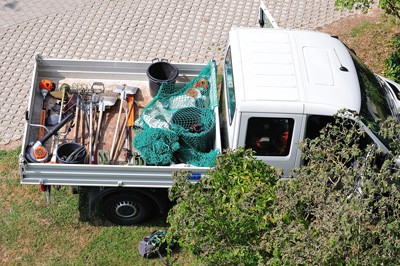Business Vehicle Insurance – Steps to Take to Ensure Correct Coverage

Authored by Michigan personal injury attorney, Kevin Komar
You might be a carpenter, electrician, or mason. You have worked your fingers to the bone day-after-day, year-after-year to become your own boss and build a successful business. You’ve put in nights and weekends to create the foundation upon which your business now stands. For those efforts, we applaud you. But you also need to make sure your business won’t unravel in the blink of an eye. We’re talking about business vehicle insurance. Insuring the vehicles that keep your business going is obviously important. But certain pitfalls of small business automobile insurance coverage could unravel your budding company in the blink of an eye. For all the hustlers, entrepreneurs, and self-employed out there, this one’s for you.
Everything to Know About Business Vehicle Insurance
As a small business owner, you might depend on company vehicles not only to get you from point A to point B safely but to also get tools, materials, and even employees to around as well. But what happens if another vehicle crashes into yours on the way to a job site? What happens when the car accident causes injuries to you, your employees, or destroys your vehicle?
You’ve suffered tragedy. The last thing you want is for it to strike again when your insurance company pulls the rug out from under you due to some policy technicality. You could be left with no vehicle, income, and thousands in unpaid medical bills. This could mean the difference between a thriving company and one that is forced to close its doors.
You can prevent further tragedy by working effectively and cooperatively with an insurance agent or directly with the insurance company. Under Michigan law, an insurance agent is only an “order taker” from you. This means that if you call your insurance agent and request to cover a vehicle, they will then fulfill that request with an automobile insurance carrier. However, there are many pitfalls that you have to watch out for when insuring business vehicles. The following are some successful ways to ensure proper coverage.
Make sure your agent and carrier know you are a business owner
First and foremost, make sure your agent and insurance carrier know you have your own business. If your business is new and you’re still driving around a truck that you used before you started this business, double-check to make sure that your insurance agent and insurance carrier know that you use this truck as part of your business. Oftentimes, someone in the skilled trades is working for another company when they decide to start their own company. They then use their own personal truck or van as part of the new business. It’s important to let your agent know that you are now using your personal vehicle for business purposes.
While you may have obtained liability or even worker’s compensation insurance for your business, you might have overlooked ensuring your vehicle (which is the backbone and a necessity to your company) has the correct business vehicle insurance coverage. An auto insurance company may deny a claim simply because they didn’t know you use it for business. Time and again, our attorneys see cases where insurance companies deny payment of benefits on these grounds alone, leaving business owners to foot all the medical bills. In addition, any vehicle damage claims will also be denied.
Do not add a work vehicle to your personal policy yourself
Additionally, don’t call your insurance agent and adding a brand new work vehicle to your personal automobile insurance policy. Many automobile insurance companies these days will not insure a business vehicle unless you also have your business’s liability insurance and workers’ compensation insurance through that same carrier. Simply because you add a vehicle onto an automobile insurance policy does not mean it’s the proper coverage. In this scenario, if you were injured while using this vehicle while it’s insured under your own personal policy, your automobile insurance carrier may claim fraud because a personal automobile policy is usually cheaper than a commercial policy. Again, you don’t want to be in a situation where you are injured with no available automobile insurance coverage to protect you.
Make sure the agent and carrier know the who, the what, and the how before you obtain the insurance
Next, be sure to fully advise your insurance agent of where and what you will be doing with this vehicle. As a contractor, sometimes a job is too lucrative to turn down and that lucrative job might actually be out of state. If you will be transporting construction materials, dangerous chemicals, or even employees across state lines, be sure to advise your insurance agent. Sometimes an automobile insurance carrier that covers your vehicle will also claim fraud because they will claim that you never told them the vehicle would be driving across state lines or hauling construction materials, or even expensive tools or chemicals. Again, these are examples that insurance companies have used in the past to avoid paying legitimate claims. The old insurance company mantra was “delay, deny, defend.” Don’t make it easy for them to do those things to you and your business.
Have the agent explain the application and double-check the coverage when you get your policy
As mentioned above, Michigan law deems an insurance agent as simply an “order taker” when you add a vehicle. Insurance agents are under no obligation to ask any sort of question, whatsoever, about the use of the vehicle, where it will be driven, who will drive it, or who the titled owner is. For this reason, explaining thoroughly the specifics regarding your business vehicle is imperative during the application process. Accurate information ensures proper business vehicle insurance coverage. Make sure to ask a lot of questions. Never assume that, because of a longstanding relationship with your agent, that they’ll automatically know this is a business vehicle. Furthermore, if you can get all of this information in writing to your agent, the better. It’s always better to have a paper trail should you face any claims or lawsuits in the future. Once you’ve conveyed all pertinent information to your agent, ask them to review it with you.
Read the materials
Once confirmed for coverage and you receive your policy, read it. Make sure what you discussed with the agent is part of the policy. Many insurance agencies are volume-based and just want to make as many sales as possible. This often comes at the sacrifice of quality. If the agent messed up the coverage, they could mess up your business if tragedy strikes.
The bottom line is that you’ve worked hard to call yourself your own boss. With proper business vehicle insurance coverage, you can ensure that the vehicle you use at work is repaired and, more importantly, that any injuries you or your employees suffer in instances of car accidents are compensated for. The key is to communicate with your agent and the insurance company. Don’t make it easier for an insurance company to delay, deny, and defend.
If you’ve been in a Michigan auto accident, call our experts at Sinas Dramis Law Firm today at 866.758.0031 or request a free initial consultation.


